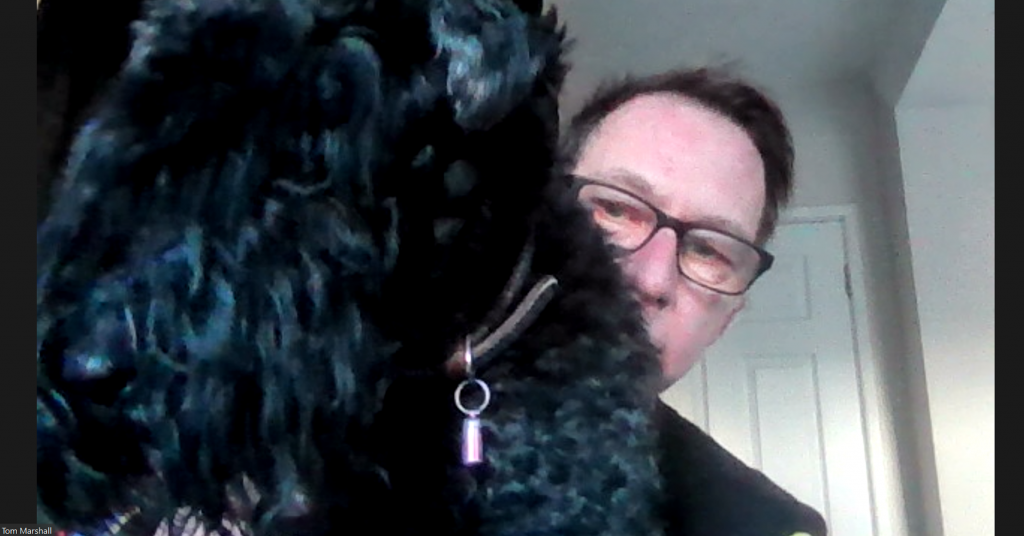Often, my morning exercise is walking with my dog in the local park or driving to a forest or the beach. During our midweek walk, the morning traffic is angrily competing for road space. Commuters try again, in vain, to get to work as quickly as possible because the rush-hour commute is a repetitive, unbearable necessity. They will never succeed. Buses, as viral and bacterial Petri dishes, usually too full, now run empty – I feel the desire to jump on just to feel calmness and experience space on a morning commute or to travel somewhere that is not the too familiar streets near my home. This morning, like many at the moment, feels like Christmas day morning. But today is not Christmas day; it is the morning of (another) Coronavirus day. What is essential on Christmas morning, the desire to visit family, friends and lovers in person are now redundant, prohibited endeavours. The usual chill of Christmas morning is replaced with the cold shudders of approaching invisible particles.
The streets look like they do on Christmas morning – deserted and lonely, symbolising forthcoming seasonal celebrations. Except yesterday, today and until who knows when, people are not driving to hug loved ones. Coronavirus morning’s deserted and lonely streets represent restrictions, unwilling but understood isolation. Christmas day is planned weeks and months in advance. Corvid day was brutally surprising. One moment I was planning where to take visiting friends from New Zealand around the wonders of Northern Ireland’s natural beauty. Within a few short minutes, the TV beamed the Prime Minister’s instructions – preparations for the days ahead floundered, disappearing because of a politician’s few short sentences of instantaneous doom.
On Christmas morning the sight of a lone dog walker is imbued with the quiet anticipation of the day ahead – a time of peace before the ritual of the welcomed lock-down before the cacophony of family and friends swells the home. For the lone dog walker, Christmas morning is an early start in preparation of the approaching hours of chopping and roasting. The lone dog walker on Christmas morning may represent the sadness of an isolated person who wants to avoid the spectacle of family and friends soon to gather. Today, on Coronavirus morning, the lone dog walker is functional and obedient. The Government has instructed the population to take one period of exercise per day then stay inside. The lone dog walker uses their daily perfunctory ‘allowance’ to exercise themselves and their loved one before they abide by the government’s control orders. The dog and their walker usually take leisurely, playful strides. Today, on a Coronavirus morning, their walk is brisk, avoiding the usual interactions with other familiar dogs and their owners – a purposeful walk and the goal is avoidance and to be at home as soon as possible. On Coronavirus days, the government doesn’t allow leisurely, playful walks, at least that is what we read. The taken for granted joy we once felt while walking outdoors has haemorrhaged into the drain of the necessary command, “avoid…isolate…stay at home”.
The joy and expectation of visiting others and taking a forest stroll is now a vilified experience. Guilt replaces joy, and freedom is consumed by paranoia. On Christmas morning we crave the proximity of others and chat with those we chose to invite into our self-imposed-lockdown. Today we crave virtual proximity as the structurally-imposed-lockdown demands distance. Internally we shriek in horror when a stranger passes too close, and we stare from our homes surveilling the streets like secret police to see if our neighbours have grasped the concept of ‘essential’ trips out of the home. On Christmas morning we survey the streets to see who is coming and going to our neighbour’s seasonal celebration. Today we are secret police, mentally noting which neighbour deserves our vilification. Will they ever be ‘our’ neighbour again?
While Christmas day involves planning, Coronavirus day does not offer that luxury. When shopping for Christmas presents, we navigate the shopping aisles and streets searching for the prey that are gifts and luxuries to eat. We make sure we are bowed down with unnecessary necessities. Now we navigate the aisles and streets because we are the prey of Coronavirus day. The in-store pre-Christmas day hustle and bustle with throngs of chatting consumers is replaced by lines of silent, hunched people queuing outside shops. The hunched and the silent display an embodied habitus of a new predicament – the imposition of the weight of what would previously have been described as draconian dictates, now realised as a necessary burden. Once inside a shop, we squeeze into voids, estimating two meters of social distance because we have become the prey – nature’s hierarchy is now, for the human, unbalanced. Humans have long thought that they are at the tip of nature’s hierarchy – in reality that was how we justified our sole claim to take resources from the earth and from those whom we deem too weak to claim their rightful ownership – the landless and the helpless. A particle preys upon us now and we enforce our self-imposed right to survive. A particle has replaced the human at the tip of nature’s hierarchy.
On Corona day, just as on Christmas morning, the vulnerable worry…they worry because they don’t know if there will be enough essentials for tomorrow or if an elderly care home resident’s quietly imposed ‘do not resuscitate’ form and media reports of potential health care rationing will mean they may not have a tomorrow. The well-off worry if they have enough luxuries or if they should have bought that extra just in case gift, or if they should have bought just a little bit more, just in case. Christmas means buying clothes, perfumery, books we think a recipient will like, or a presenting someone with a ‘here’s something that I know you’ll never wear but it reassures me that I’ve bought you something’ gift. Coronavirus means buying toilet roll, soap, pasta and flour, just in case. At Christmas we boast that we’ve bought THAT present, during Coronavirus day we boast that we’ve found toilet roll.
At Christmas, in anticipation, we sign our cards with the insincere mantra, ‘let’s meet up in the New Year’. During Coronavirus days, in anticipation, we sign our social media with promises to keep the mind and body healthy, to embrace the sounds and sights of nature that spills into the quietness and repeat the similar but trodden ‘we’ll meet when this is all over’ mantra. We want what we cannot have. Are our post- Coronavirus day anticipated desires reality our post-Christmas wish lists? Will our new social media mantras be just as insincere?
The once invisible NHS staff work as usual on Christmas day. Rarely were the people who are the NHS so visible and designated as heroes as they are on Coronavirus days. Nothing has changed – before Coronavirus day our NHS staff were, as today, skillful, brave, selfless and dedicated, just not appreciated as much as they are now in public and private discourses. As Coronavirus mornings rise, the NHS staff are applauded by a sincere pubic and (in?)sincere politicians. The dawning of Coronavirus morning has exposed the invisible NHS worker, for now?
After Christmas day, it is life and business as usual as our intentions to revitalise ignored aspects of our life are subsumed by familiar routines which have no room for new anticipations. And after Coronavirus…?
For now, it is Coronavirus day, all day, for many days. When Coronavirus day dissipates, how will we have survived, will we have changed?



